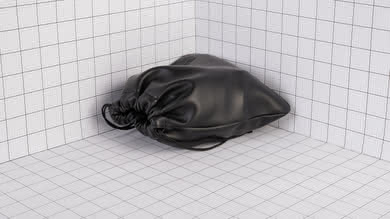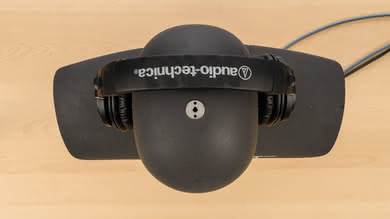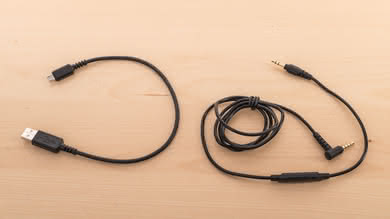Our Verdict
Good for neutral listening. The Audio-Technica ATH-M50xBT have a good audio reproduction with a flat, but slightly overemphasized bass range, even mid-range, and well-balanced treble. Unfortunately, their companion app doesn’t have any presets or even an EQ for additional customization options to find the best sound signature for you. They aren’t better than the wired model for this use case but are still good sounding and versatile wireless headphones.
- Good audio reproduction.
- Sturdy and comfortable build.
- Excellent battery life.
- Poor noise isolation.
- Long charge time.
- Slightly inconsistent in the bass range, especially if you wear glasses.
Average for commuting. Their isolation performance isn’t the best, especially since they don’t have any noise canceling feature. The Audio-Technica ATH-M50xBT practically don’t isolate noise in lower frequencies, where engine rumble sits. They also leak a bit at higher volumes, so you shouldn’t blast your music through these headphones if you don’t want to bother people surrounding you. On the upside, they are comfortable for long trips and their 38-hour battery life is more than enough for flights.
- Good audio reproduction.
- Sturdy and comfortable build.
- Excellent battery life.
- Poor noise isolation.
- Long charge time.
- Slightly inconsistent in the bass range, especially if you wear glasses.
Okay for sports. Over-ears aren’t recommended for sports since they trap heat inside the ear cup and could experience more sweating than usual. Also, they feel fairly loose on the head and move around during physical activity. The cumbersome over-ear design might also be too bulky for certain gym exercises.
- Good audio reproduction.
- Sturdy and comfortable build.
- Excellent battery life.
- Poor noise isolation.
- Long charge time.
- Slightly inconsistent in the bass range, especially if you wear glasses.
Above-average for the office. If you’re looking for background music while working, they don’t leak too much at moderate volumes and can reduce an average amount of ambient chatter. Their long battery life will last you a few work days without a problem and will be comfortable for long listening sessions.
- Good audio reproduction.
- Sturdy and comfortable build.
- Excellent battery life.
- Poor noise isolation.
- Long charge time.
- Slightly inconsistent in the bass range, especially if you wear glasses.
Sub-par for gaming. While the Audio-Technica ATH-M50xBT are comfortable, their latency is too high for gaming. If you plan on using them with the included audio cable to get rid of latency, you can expect a better microphone performance than the integrated one that was measured. However, they won’t be as customizable as other gaming headsets we’ve reviewed.
- Good audio reproduction.
- Sturdy and comfortable build.
- Excellent battery life.
- Poor noise isolation.
- Long charge time.
- Slightly inconsistent in the bass range, especially if you wear glasses.
- Good audio reproduction.
- Sturdy and comfortable build.
- Excellent battery life.
- Poor noise isolation.
- Long charge time.
- Slightly inconsistent in the bass range, especially if you wear glasses.
Changelog
- Updated Sep 20, 2021: Corrected measurement units from inches to centimeters in 'Portability'. We have also corrected measurements from feet to meters in 'Line of Sight', and 'Wired | Length'.
- Updated Sep 16, 2021: Converted to Test Bench 1.5.
- Updated Jun 23, 2021: Updated the 'Bluetooth' test with more detailed instructions for pairing the headphones.
- Updated Feb 14, 2020: Converted to Test Bench 1.4.
Check Price
Popular Headphones Comparisons
The Audio-Technica M50xBT are good wireless headphones for critical listening. They have a good and well-balanced audio reproduction, suitable for a wide variety of music genres. They are the wireless equivalent of the very popular wired ATH-M50x, and their good build quality is practically the same. They also have wide and well-padded ear cups that should fit most ears. They have controls on the ear cup and can also be used wired with the included audio cable, even if the battery is dead. See our recommendations for the best wireless headphones, the best studio headphones and the best headphones under $200.
The Sony WH-CH700N Wireless are slightly better headphones than the Audio-Technica ATH-M50xBT. They are compatible with the Sony Headphones Connect app which allows lots of sound customization options, while the Audio-Technica app lacks features. Also, they are noise cancelling headphones, but this feature doesn’t actually seem to perform well. The Sony are also very sensitive to glasses. On the other hand, the Audio-Technica are better-built headphones and have a better wireless range thanks to the Bluetooth 5.0 support.
The Audio-Technica ATH-M50xBT2 Wireless offer some improvements over the Audio-Technica ATH-M50xBT. Their continuous battery life is longer, they offer sound customization options and multi-device pairing, and they have an integrated mic with better recording quality. They also have a less boomy default sound profile. However, unlike their predecessor, they don't support the aptX codec. Some may also prefer the ATH-M50xBT's more bass-rich sound.
Both headphones have a similar design and performance, but the Audio-Technica ATH-M50xBT are better multi-purpose headphones than the regular wired Audio-Technica ATH-M50x, which are better for studio use. The M50xBT are wireless, which makes them more convenient to use, and they have a decent control scheme on the ear cups, while the wired model doesn’t have any. On the other hand, the regular M50x have a design meant for audio production with zero latency and no need to monitor battery levels.
The Sennheiser HD 4.50 BTNC are better headphones than the Audio-Technica ATH-M50xBT. The Sennheiser have a decent noise cancelling feature that the Audio-Technica lack and can connect to two devices simultaneously, which is convenient. However, the Audio-Technica have almost twice the battery life, a slightly better-balanced sound profile, a better microphone for calls, better wireless range, and are slightly more comfortable.
Test Results

The Audio-Technica ATH-M50xBT isn’t very different from their wired equivalent ATH-M50x. They have the same bland studio look with an all-black design that some may like. They also still have silver accents on the ear cups around the company logo, and overall, they look good, but won’t stand out. Unfortunately, they do not come in any color variant to fit your preferred style like the wired ATH-M50x.
The Audio-Technica ATH-M50xBT are built very similarly to the regular wired M50x and are as comfortable. They are larger than the ATH-M40x, which makes them a bit more comfortable and suitable for larger ears, but are on the shallow side. The headphones are fairly lightweight and don’t apply too much pressure on the head and don’t feel too tight. The padding on the ear cups is comfortable but might feel bit stiff right out of the box.
Unlike the M50x, the Bluetooth variant has controls on the ear cups for on-the-fly functionalities. You get a volume control, play/call management button and you can also access your device's voice assistant like Siri or Google Assistant with a long touch over the logo on the left ear cup. However, it's finicky and doesn’t seem to work consistently. That said, the control scheme is fairly easy to use, and the provided feedback from the physical buttons is good. You also get audio feedback for track skipping, min/max volume and also play/pause music. You can also access Bluetooth pairing by holding down the '+', '-', and center control buttons simultaneously for roughly eight seconds.
Like most over-ears, the ATH-M50xBT trap heat under the ear cups. These headphones are not designed to be sports headphones, and you should expect more sweat if you’re using them during your workouts. This shouldn’t be too much of a problem for casual listening, but breaks are recommended to let the ears cool off.
Update 09/20/2021: We implemented changes in our unit measurements. Originally, we displayed our results in inches. However, we changed to centimeters, and the conversion was supposed to happen automatically across our reviews. These headphones mistakenly kept the previous values obtained in inches and didn't convert them, which caused the score to inflate. As a result, we remeasured our values and volume. The scoring of this box has also changed from '8.4' to '5.9'.
The Audio-Technica M50xBT aren’t very portable over-ear headphones, but they do fold into a more compact format, and you can easily store them in a bag. They also have swiveling cups to lay flat, making them more comfortable to wear around your neck when not using them. They also come with a soft pouch to protect them during traveling.
The ATH-M50xBT are practically the normal M50x, but without a cable. They are made of dense plastic that gives them a durable and well-built feel. The headband is also reinforced with a metal frame and doesn’t feel flimsy. Like most of the Audio-Technica lineup, the joints seem to be the weak spots of the headphones and could be the first thing susceptible of breaking.
The Audio-Technica ATH-M50xBT headphones were not designed for sports and aren’t stable on the head. During sports and high-intensity activities, they will slip off your ears. This shouldn’t be a problem for casual listening, and since they have a wireless design, you don’t have to worry about a cable getting stuck on something and snagging the headphones off your head.
The frequency response consistency is average. In the bass range, the biggest deviation measured was 10dB at 20Hz, which was measured on the human subject wearing glasses. In higher frequencies, they seem to vary by less than 5dB, below 10KHz, between re-seats, which is good. When comparing these results to the wired ATH-M50x, consider that our human test subject with glasses wasn’t present during the frequency response consistency testing on the wired variant, and we expect both models to perform similarly.
The bass response is great. LFE (low-frequency extension) is at 10Hz, which is excellent. Also, the whole bass response is well-balanced and even but slightly overemphasized by about 2.5dB. This gives these headphones a bit of extra thump and rumble which some may like, especially fans of bass-heavy genres. However, they tend to sound a bit boomy due to the high-bass overemphasis.
The mid-range performance is good. The overall response is fairly flat, but with an audible dip in the low-mid and mid-mid ranges. This will make vocals and lead instruments sound thin and pushed to the back of the mix.
The treble performance is very good. The response is rather uneven, but well-balanced across the whole range. However, the dip around 6KHz will make vocals, leads, and cymbals lack a bit of detail and brightness. On the other hand, the peak at 10KHz could make the S and Ts sound a bit sharp on already bright tracks.
The Audio-Technica M50xBT have good imaging. Their weighted group delay is 0.36, which is very good. The graph also shows that the group delay is almost entirely below the audibility threshold. This ensures a tight bass and a transparent treble reproduction. Additionally, the L/R drivers of our test unit were well-matched in amplitude, frequency, and phase response, which is important for the accurate placement and localization of objects (voices, instruments, video games effects) in the stereo image.
The soundstage of the wireless M50xBT is sub-par. The PRTF graph shows decent accuracy and a good amount of pinna activation. However, there is not a notch present around 10KHz, meaning that the soundstage will be perceived to be located inside the listener’s head instead of in-front. If you're looking for wireless headphones with a more open and spacious soundstage, consider the open-back HiFiMan ANANDA-BT Wireless.
The isolation performance is sub-par. These headphones don't have active noise cancelation and do not provide any isolation in the bass range. This means they will let in all the rumbling of engines. In the mid-range, important for blocking out speech, they isolate by about 9dB, which is average. In the treble range, occupied by sharp sounds like S and Ts, they achieved 30dB of isolation, which is good.
The leakage performance is average. The significant portion of their leakage is spread across the mid and treble ranges, between 400Hz and 6KHz, which is broad. However, the overall level of the leakage is not very loud. With the music at 100dB SPL, the leakage averages at 43dB SPL and peaks at around 54dB SPL at 1 foot away, which is about the noise floor of most offices.
The recording quality of the integrated microphone is above-average. The bump around 50-100hz indicates this mic might be prone to lower frequency noise and pops. The HFE (high-frequency extension) of 3.5KHz means that speech will be noticeably muffled and lacking detail. However, the limited high-frequency extension is a limitation of the Bluetooth protocol and is a problem with all Bluetooth microphones.
The integrated mic is mediocre at noise-handling. In our SpNR test, the ATH-M50xBT achieved a speech-to-noise ratio of 11.5dB, indicating they are best suited for quiet environments and will struggle to separate speech from ambient noise in moderate and loud situations.
The battery life of the ATH-M50xBT is excellent with about 38 hours of continuous playback. They should easily last you a few days even if you are an avid listener. However, they take about 5 hours to charge fully, which is above-average and might be too long for some. They also don’t have any power saving features to extend battery life. On the upside, you can still use them with the Bluetooth connection while they are charging with the USB cable. Even if the battery dies, you can also use the included 1/8” TRRS audio cable to use the headphones passively.
The companion app for the Audio-Technica M50xBT is lackluster. The app lets you know the last known location of the headphones, the battery life and the option to choose the codec connection. You do not get any customization options to enhance your listening experience, which is disappointing. Also, we had trouble with the Android version of the app, which would take several seconds, even minutes, to connect. It kept searching for a device and restarting the app seemed to solve the issue sometimes.
Update 09/20/2021: We've implemented changes in our unit measurements. Originally, the 'Line Of Sight Range' measurement was displayed in feet. However, we now use meters. This conversion was supposed to happen automatically across our reviews, but these headphones mistakenly kept the previous values obtained in feet. As a result, we have retested 'Line Of Sight Range' using Bluetooth 5.0, and the results have changed from '53m' to '63.8m'. The scoring of this box has also changed from '7.2' to '7.0'.
Update 06/23/2021: We originally reported that these headphones didn't have a Bluetooth pairing mode. However, this was incorrect. We've updated our text with instructions on how to access their pairing mode. Note that the scoring of this box hasn't changed.
The Audio-Technica ATH-M50xBT headphones support Bluetooth version 5.0. Unfortunately, they don't support NFC and can’t connect to multiple devices simultaneously. If you want to enter Bluetooth pairing mode, you can hold the '+', '-', and middle control buttons simultaneously for approximately eight seconds. The headphones then beep, and a voice prompt notifies you that they've been disconnected. The indicator light on the ear cup also starts quickly blinking white to let you know that they're in pairing mode. When you've completed the pairing process, there's an audio prompt, and the indicator light slowly fades in and out.
Like most Bluetooth headphones, the ATH-M50xBT have fairly high latency, which means they may not be suitable for watching videos and gaming. They support aptX, which helps lower latency a bit but not by very much. That said, some devices and video content apps offer some latency compensation, so you may not be affected by audio latency depending on the device and streaming app you use. You can also use the headphones passively with the included 1/8” TRRS cable to eliminate latency.
Update 09/20/2021: We have implemented changes in our unit measurements. Originally, the 'Length' measurement was displayed in feet. However, we now use meters. This conversion was supposed to happen automatically across our reviews, but these headphones kept the previous values obtained in feet. As a result, we have converted the value from '4.1ft' to '1.25m'. The scoring of this box hasn't changed.
You can use the provided 1/8” TRRS cable to use the ATH-M50xBT passively, which will also get rid of latency issues. You can also use the headphones wired when the battery is dead, which is very convenient. The in-line remote works with consoles and PC, and the headphones have audio and microphone support.
The Audio-Technica ATH-M50xBT do not have a base/dock. If you want a versatile headset with a base that you can also use wired, check out the SteelSeries Arctis 7.
















